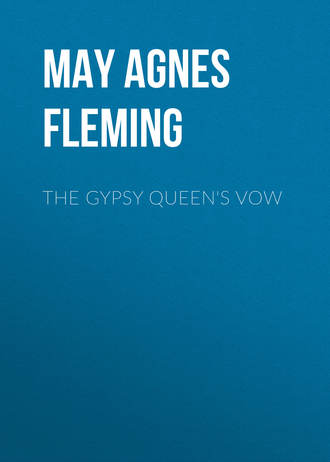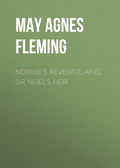
May Agnes Fleming
The Gypsy Queen's Vow
“You thought you was gone – didn’t you?” said the little witch, Raymond, with a malicious chuckle of delight, as he watched the chopfallen hero of the pallid features.
Miss Toosypegs merely contented herself with a look of lofty contempt more withering than words, and then rustled out to rouse up the “hugly black leeches” on the subject of dinners and fires.
Having succeeded in both objects especially in the dinner department, which Aunt Bob, the presiding deity of the kitchen, had got up in sublime style, Miss Priscilla was in somewhat better humor; and having announced her intention of beginning a thorough reformation both out doors and in, turned briskly to her nephew, who sat in a very dejected state of mind, without so much as a word to say for himself, and exclaimed:
“Now, Horlander, the best thing you can do is, to go immediately hand see habout getting a ’ouse for Mrs. Ketura hand the children, which would never survive a day in this damp hold barn; besides, being to do some time or hother, it mayhas well be did first has last, hand save the ’spense hof a doctor’s bill, which his the hunpleasantest thing hever was stuck hin hanybody’s face.”
Mr. Toosypegs, who felt he would never more dare to call his soul his own, meekly put on his hat, and said he would go and see about a cottage he knew of which would suit Mrs. Ketura to a T. The fact was, he was glad to escape from his aunt; and that good lady, who had classed Mrs. Ketura and the children under the somewhat indefinite title of “riff-raff” from the first, was equally anxious to be rid of them.
Late that evening, Mr. Toosypegs returned, with the satisfactory news that he had obtained the cottage, which belonged, he informed them, to a certain Admiral Havenful, who, not having any particular use for it himself, said they might have it rent free. The cottage was furnished; just as it had been let by its last tenant; and Mrs. Ketura might pitch her tent there, with a safe conscience, as fast as she liked.
“You had better take one of the servants with you, too,” said Mr. Toosypegs, good-naturedly; “we have more than we want, and you will require one to mind the baby, and fetch water, and do chores. I think Lucy will do as well as any.”
Miss Toosypegs frowned at first; but remembering, upon second thoughts, that there was already a tribe of useless negroes and dogs, eating them out of house and home, she gave a sharp assent, at last, to her nephew’s arrangement.
Early the next morning, Mr. Toosypegs, Ketura, Raymond, Erminie, and the negress, Lucy, entered the wagon, and turned their backs upon Dismal Hollow.
Half an hour’s drive through a forest-road, all aglow with the leafy splendor of early July, brought them to the seashore. Far removed from any other habitation, stood a pretty little whitewashed cottage, a little fairy-bandbox of a place, on a bank above the sea, nestling like a pearl set in emeralds as it gleamed through a wilderness of vines and shrubs. A wide, dry, arid expanse, overrun with blueberry and cranberry vines, spread before the door toward the north, as far as the eye could reach. Far in the distance, they could see a huge house, of a dazzling whiteness, unshaded by tree or vine, as it stood in the full glare of the hot sun, dazzling the eye of the gazer. This, Mr. Toosypegs gave them to understand, was the “White Squall,” the residence of Admiral Havenful; and the dry plains spreading into the distance were very appropriately known as the “Barrens.” South and east, a dense forest shut in the view, and to the west spread out the boundless sea.
“Now, Mrs. Ketura,” said Mr. Toosypegs, in a mysterious whisper, “you can’t live upon green vines and blueberries, nor yet you can’t stay in this cottage from morning till night, you know, though I dare say Aunt Priscilla thinks you can. Therefore you must take this purse – half of which the admiral gave me for you last night, and the other half – well, no matter. Then, as you’ll want to go to Judestown to market, and to church, sometimes, I’ll send over the pony and the old buggy; but don’t you say a word about it to Aunt Priscilla – women don’t need to know anything, you know, as they don’t always view things in their proper light; and Aunt Priscilla’s queer any way. If there’s anything else you want, just you send Lucy for it to Dismal Hollow, and you shall have it, Mrs. Ketura, for I like you real well.”
“You are very kind,” said the gipsy, again touched by his good-nature; “and I hope you will always regard yourself as one of the family.”
“Hark you, Mrs. Ketura,” said Mr. Toosypegs, in a tone of delight. “I certainly will, since you wish it. I’ll drop in very often. I’m very much obliged to you.”
And, waving his hand briskly, Mr. Toosypegs resumed his seat in the wagon, and drove off again to Dismal Hollow.
CHAPTER XV.
AFTER MANY DAYS
“I will paint her as I see her.
Ten times have the lilies blown
Since she looked upon the sun.”
– Browning.
And ten years passed away.
It was a jocund morning in early spring. From the pine woods came the soft twittering of innumerable birds, filling the air with melody; while the soft, fragrant odor of the tall swinging pines came floating on every passing breeze. The sun rose in unclouded splendor above the dark tree-tops, and the bright waves of the Chesapeake danced and flashed in the golden rays. No sound broke the deep, profound stillness of the wide, dry moor; no living thing, save now and then some solitary bird that skimmed along over the fern, was to be seen. Far away in every direction nothing met the eye but the blue, unclouded sky above, and the bleak, arid barrens below, that lay hot and dry in the glare of the morning sunshine.
Suddenly the sylvan silence of the spot was broken by the clear, sweet notes of a hunting-horn, that startled the echoes far and near, and the next moment the forms of a horse and rider came dashing over the moor.
The horse was a splendid animal, a small, jet-black Arabian, with graceful, tapering limbs, arching neck, flowing mane, and small, erect head, and bright, fiery eyes. His rider was a young girl of some twelve years, who sat her horse like an Arab hunter, and whose dark, unique style of beauty merits a wider description.
She was very slight and rather tall for her age; but with a finely proportioned figure, displayed now to the best advantage by her well-fitting riding-habit – which consisted of a skirt of dark-green cloth, a tight basque of black velvet. Her face was thin and dark and somewhat elfish, but the olive skin was smooth as satin, and deepening with deepest crimson in the thin cheeks and lips. Her forehead was low broad, and polished; her saucy little nose decidedly retrousse; her teeth like pearls, and her hands and feet perfect. And then her eyes – such great, black, lustrous, glorious eyes, through which at times a red light shone – such splendid eyes, vailed by long, jetty, silken lashes, and arched by glossy black eyebrows, smooth and shining as water-leeches – eyes full of fun, frolic, freedom, and dauntless daring – eyes that would haunt the memory of the beholder for many a day. Her hair, “woman’s crowning glory,” was of intensest blackness, and clustered in short, dancing curls round her dark, bright, sparkling face. In the shade those curls were of midnight darkness, but in sunshine, red rings of fire shone through like tiny circlets of flame. She wore a small, black velvet hat, whose long sable plume just touched her warm, crimson cheek.
Such was the huntress, who with a pistol stuck in her belt, a little rifle swung across her shoulder, dashed along over the moor, holding the bridle lightly in one hand, and swinging jauntily, a silver-mounted riding-whip in the other.
As she reached the center of the moor, she reined in her horse so suddenly that he nearly reared upright, and then, lifting her little silver bugle again to her lips, she blew a blast that echoed in notes of clearest melody far over the heath.
This time her signal was answered – a loud shout from a spirited voice met her ear, and in another instant another actor appeared upon the scene.
He, too, was mounted, and rode his horse well. He was a tall, slender stripling of about fifteen, and in some ways not unlike the girl. He had the same dark complexion, the same fiery black eyes and hair; but there all resemblance ceased. The look of saucy drollery on her face was replaced on his by a certain fierce pride – an expression at once haughty and daring. He was handsome, exceedingly, with regular, classical features, a perfect form, and had that mark of high birth, the small and exquisitely-shaped ear, and thin curving nostril. Erect he sat in his saddle, like a young prince of the blood.
“Bon matin, Monsieur Raymond!” shouted the girl, as he gallantly raised his cap and let the morning breeze lift his dark locks. “I thought the sun would not find you in bed the first morning after your return home. How does your serene highness find yourself?”
“In excellent health and spirits. I’m very much obliged to you – as our friend Mr. Toosypegs would say,” answered Master Raymond, for he it is, as he laughingly rode up beside her. “Where’s Ranty?”
“In bed. That fellow’s as lazy as sin, and would rather lie there, sleeping like some old grampus, than enjoy a ride over the hills the finest morning that ever was.”
“How do you know grampuses are fond of sleeping?” said Raymond.
“How do I know?” said the girl, in a high key, getting somewhat indignant. “I know very well they are? Doesn’t Miss Toosypegs, when she’s talking about Orlando sleeping in the morning, always say he’s ‘snoring like a grampus’? and if Miss Priscilla doesn’t know, that’s been to England, and every place else, I would like to know who does!”
“Well, I’ve been to England, too,” said Raymond.
“Yes, and a great deal of good it’s done you!” said the young lady, contemptuously. “But that’s the way always. Ever since Ranty and you went to college, you’ve got so stuck up, and full of Latin and Greek, and stuff, there’s no standing either of you. Last night, Ranty had to go and ask aunt Deb for the bootjack in Latin, and when she couldn’t understand him, he went round kicking the cat and my nine beautiful kittens, in the most awful manner that ever was; and swearing at her in Greek – the hateful wretch!”
And Miss Petronilla Lawless scowled at Raymond, who laughed outright.
“Oh! come now, Pet, don’t be angry!” he said. “Where’s the use of quarreling the very first morning we meet.”
“Quarreling!” repeated Miss Pet, shortly: “I’m sure I don’t want to quarrel; but you’re so aggravating. Boys always are just the hatefulest things – ”
“Most hateful, Miss Lawless,” amended Raymond, gravely. “There’s a great deal of good sense but bad grammar in that sentence. I don’t like boys myself half so well as I do girls – for instance, you’re worth a dozen of Ranty.”
“Yes; you say so now, when Ranty ain’t listening; but if you wanted to go off on some mischief or other, I guess you wouldn’t think of me. But that’s the way I’m always treated, pitched round like an old shoe, without even daring to say a word for myself.”
This melancholy view of things, more particularly the idea of Miss Pet’s not having a “word to say for herself,” struck Raymond as so inexpressibly ludicrous, that he gave vent to a shout of laughter.
“Yes, you may laugh!” said Pet, indignantly; “but it’s true, and you ought to be ashamed of yourself, making fun of people in this way. I am not going to stand being imposed upon much longer, either! If Miss Priscilla keeps snubbing and putting down Mr. Toosypegs all the time, that ain’t no reason why I’m to be snubbed and put down too – is it?”
“Why, Pet, what’s the matter with you this morning?” exclaimed Raymond. “I never knew you so cross; has the judge scolded you, or have you bagged no game, or has your pony cast a shoe, or – ”
“No, none of them things has happened!” broke in Pet, crossly. “I suppose you’d keep on or, or, or-ing till doomsday, if I let you! It’s worse still, and I wouldn’t mind much if you shot me on the spot!” said Pet, in a tone of such deep desperation that Raymond looked at her in real alarm.
“Why, Pet, what has happened?” he inquired, anxiously, “Nothing really serious, I hope.”
“Yes, it is really serious. I’m going to be sent to school – there now!” said Pet, as near crying as an elf could be.
“Oh! is that all?” said Raymond, immeasurably relieved. “Well, I don’t see anything so very dreadful in that.”
“Don’t you, indeed?” exclaimed Pet, with flashing eyes. “Well, if there’s anything more dreadful, I’d like to know what it is! To be cooped up in a great dismal dungeon of a schoolhouse from one year’s end to t’other, and never get a chance to sneeze without asking leave first. I won’t go, either, if I die for it!”
“And so you’ll grow up and not know B from a cow’s horn,” said Raymond. “I am sure you need to go bad enough.”
“I don’t need it, either!” angrily retorted Pet. “I can read first-rate now, without spelling more than half the words; and write – I wish you could see how beautifully I can make some of the letters!”
“Oh! I saw a specimen yesterday – Minnie showed it to me – looked as if a hen had dipped her foot in an ink-bottle and clawed it over the paper.”
“Why, you horrid, hateful, sassy – ”
“Abandoned, impertinent young man!” interrupted Raymond. “There! I’ve helped you out with it. And now look here, Pet, how do you expect to be raised to the dignity of my wife, some day, if you don’t learn something? Why, when we are married, you’ll have to make your mark!”
“I’ve a good mind to do that now with my whip!” exclaimed Pet, flourishing it in dangerous proximity to his head. “Your wife, indeed! I guess not! I’m to be a President’s lady some day, Aunt Deb says. Catch me marrying you!”
“Well, that will be your loss. Where is the judge going to send you?”
“Why, he says to the Sacred Heart; but I ain’t gone yet! I’d a heap sooner go to Judestown, with Minnie, to that school where all the boys and girls go together. Oh, Ray! there are just the nicest boys ever was there – ’specially one with the beautifulest red cheeks, and the loveliest bright buttons on his coat ever you seen!”
And Pet’s eyes sparkled at the recollection.
“Who is he?” said Raymond, who did not look by any means so delighted as Pet fancied he should.
“His name’s Bobby Brown; and only he’s all as yellow as the yolk of an egg ever since he had the ja’nders, he’d be real pretty. But I’m getting hungry, Ray. I’ll race you to the cottage, and bet you anything I’ll beat you!”
“Done!” cried Ray, catching the excitement now sparkling in the dark, brilliant face of the little fay beside him; and crushing his cap down over his thick curls, he bounded after her as she dashed away.
But Pet was better mounted, and the best rider of the two; and a ringing, triumphant laugh came borne tantalizingly to his ears as she distanced him by full twenty yards, and galloped up to the little white cottage on the Barrens.
“Fairly beaten!” he said, laughing, as he sprung off. “I am forced to own myself conquered, though I hate to do it.”
Though he laughed, his look of intense mortification showed how galling was defeat.
“Ahem! and how do you expect to be raised to the dignity of my husband some day, if you don’t learn to ride better? Why, when we’re married, I’ll have to give you lessons!” said Pet, demurely; though her wicked eyes were twinkling with irrepressible fun under their long lashes.
“Oh, I see!” said Ray, gayly. “Poetical justice, eh? Paying me in my own coin? Well, if you can beat me in riding, you can’t in anything else!”
“Can’t I, though?” said Pet, defiantly. “Just you try target-shooting, or pulling a stroke oar with me, and you’ll see! Schools where they teach you the Greek for bootjack ain’t the best places for learning them sort of things, I reckon!”
The thunder of horses’ hoofs had by this time brought another personage to the stage.
It was Erminie – “sweet Erminie,” the little beauty, and heiress of a princely fortune and estate.
The promise of Erminie’s childhood had been more than fulfilled. Wondrously lovely she was! How could the child of Lord Ernest Villiers and Lady Maude Percy be otherwise? She had still the same snowy skin of her infancy, softly and brightly tinged with the most delicate pink on the rounded cheeks; her face was perfectly oval, and almost transparent; her eyes were of the deepest, darkest violet hue; her long curls, that reached nearly to her waist, were like burnished gold, and the snow-white forehead and tapering limbs were perfect. In spite of the difference between them, though one was dark and impetuous, the other fair and gentle, yet there was a resemblance between Raymond and Erminie. You could see it most plainly when they smiled; it was the smile of Lady Maude that lit up both faces with that strange, nameless beauty.
“Oh, Pet! I’m so glad you’ve come!” she joyfully exclaimed. “Guess who’s here?”
“Who? Ranty?” said Pet.
“No, indeed. Mr. Toosypegs. He heard Ray was come, and rode over this morning to see him.”
“Oh, I must see Mr. Toosypegs!” exclaimed Ray, laughing, as he bounded past the two girls, and sprung into the house.
It was a neat, pleasant little sitting-room, with white-muslin blinds in the windows, that were already darkened with vines; clean, straw matting on the floor and chairs, table, and ceiling fairly glistening with cleanliness. There was a wide fireplace opposite the door, filled with fragrant pine-boughs, and sitting in a low rocking-chair of Erminie’s, in the corner, was our old friend, Mr. O. C. Toosypegs, perfectly unchanged in every respect since we saw him last.
“Why, Mr. Toosypegs, how do you do? I hope you have been quite well since I saw you last!” cried the spirited voice of Ray as he grasped Mr. Toosypegs’s hand and gave it a cordial shake.
“Thank you, Master Raymond, I’ve been quite well, I’m very much obliged to you,” said Mr. Toosypegs, wriggling faintly in his grasp. “So is Miss Toosypegs, so is Aunt Bob, and all the rest of the family – I’m very much obliged to you.”
“Dogs and all, I hope, Orlando?” said Pet, as she entered.
“Yes, Miss Pet, the dogs are quite well, I’m obliged to you. I hope you feel pretty well yourself?”
“No, I ain’t, then. I’m not well at all. I’ve been in a state of mind all the week, and there’s no telling how long it may last.”
“Good gracious! you don’t say so!” said the alarmed Mr. Toosypegs. “It’s not anything dangerous, I hope?”
“Well, people generally think the smallpox is dangerous!” began Pet, with a sort of gloomy sternness, when she was interrupted by Mr. Toosypegs, who, seizing his hat, rushed to the door, shrieking out:
“The smallpox! Oh, my gracious! Why, Miss Pet, how could you go to come here, and give it to us all like this? Good gracious! for to think of being all full of holes like a potato-steamer!” said Mr. Toosypegs, wiping the cold perspiration off his face.
“But the smallpox ain’t no circumstance to my trouble,” went on Pet, as if she hadn’t heard him. “I’m going to be sent to school!”
“Come back, Mr. Toosypegs; she hasn’t got the smallpox,” said Ray, laughing. “There is not the slightest danger, I assure you. Pet was only using an illustration that time.”
“Good gracious!” exclaimed Mr. Toosypegs, dropping into a chair and wiping his face with his handkerchief, “if you didn’t pretty near scare the life out of me!”
“Well, you wouldn’t be the first one I’ve scared the life out of!” said Pet, swinging her riding-whip. “I’m apt to astonish people now and then!”
“I should think so,” said Ray. “Do you remember the night she coaxed you out sailing with her, Mr. Toosypegs, and upset the boat; and then added insult to injury by pulling you on shore by the hair of your head? That was an awful trick, Pet.”
“I haven’t got it out of my bones yet,” said Mr. Toosypegs, mournfully. “I never expected such treatment from. Miss Pet, I’m sure, and I don’t know what I had ever done to deserve it.”
“Well, don’t be mad, Orlando. I’ll never do it again,” said Pet, in a deeply-penitent tone. “But, I say, Minnie, when we are going to have breakfast? I’ve an awful appetite this morning.”
“In a moment. Hurry, Lucy,” said Erminie, as she entered the room.
“I was just up-stairs, bringing grandmother her breakfast.”
“Hem! How is the old lady?” inquired Miss Pet.
“As well as usual. She hardly ever comes down-stairs now. Do hurry, Lucy. Miss Lawless will soon be starved, if you keep on so slowly!”
“Lor’ sakes! I is hurryin’, Miss Minnie,” said Lucy, as, she bustled in, drew out a small, round table, laid the cloth, and prepared to arrange the breakfast-service. “’Spect dat ar’ little limb t’inks folks ought to git up de night afore, to have breakfast ready time ’nuff for her,” muttered Lucy to herself, looking daggers at Pet Lawless, who, swinging her riding-hat in one hand and her whip in the other, watched Lucy’s motions with a critical eye. Erminie, with her sunny face and ready hands, assisted in the arrangements; and soon the whole party were assembled round the table, doing ample justice to Lucy’s morning meal.
And while they were thus engaged, I shall claim your patience for a moment, dear reader, while we cast a brief retrospective glance over the various changes that have occurred during those ten years.
By the kind care of good-natured Mr. Toosypegs, and his friend, Admiral Havenful, the gipsy Ketura had been amply provided for. As Raymond and Erminie grew up, they had been sent to Judestown to school, with the children of Judge Lawless, whose daughter, Miss Pet, has already been introduced to the reader. The dark, gloomy recluse, Ketura, was an object of dread and dislike to the neighborhood around. She shunned and avoided them, lived her own inward life independent of them all, and was therefore hated by them. And when, about a year previous to the present, time, she received a severe paralytic stroke, from the effects of which she never fully recovered, very little sorrow was felt or expressed. Sweet, gentle little Erminie was, however, a favorite with all, and so was the bold, bright, high-spirited Raymond, to whom the somewhat eccentric old Admiral Havenful took such a fancy that he insisted on sending him to college with his nephew, Ranty, or Randolph Lawless. To college, therefore, the boys went; and Erminie remained at the Barrens, and went every fine day to Judestown to the district school, sometimes, but very rarely, accompanied by Pet Lawless; for that wild young lady voted schools and school-teachers and “Committee men,” unmitigated bores, all, and preferred her own “sweet will” and her pony Starlight to suffering through “reading, writin’ and refmetic.” In vain her father, the judge, stormed and threatened her with all sorts of calamities. Pet, metaphysically speaking, snapped her finger in the face of all authority; and the more they wanted her to go, the more she wouldn’t, though she did offer to do her best to learn if they would let her go with Ray and Ranty. But gaiters were things forbidden inside the college gates; and besides Ranty very ungallantly protested that all girls in general, and “our Pet” in particular, were nothing but “pests,” and that he wouldn’t have her near him at any price. Master Ranty Lawless did not like the female persuasion, and once gruffly announced that his idea of heaven was, a place where boys could do as they liked, and where there were no girls. So as Pet had no mother to look after her, and queened it over the servants at home, she grew up pretty much as she liked, and was noted far and near as the wildest, maddest, skip-over-the-moon madcap that ever threw a peaceable community into convulsions.
This much being premised, it is only necessary to say that Ray and Ranty had returned from college for a few months’ vacation, the day previous to the commencement of this chapter, and then go on with our story.
“When is Miss Priscilla coming over, Mr. Toosypegs?” asked Erminie, as she filled for the third time his cup with fragrant, golden coffee.
“’Morrer evening,” replied Mr. Toosypegs, speaking with his mouth full; “she’s going to bring you a parcel of muslin things to work for her.”
“The collar and cape she was speaking of, I guess,” said Erminie, with her pleasant smile.
“How in the world, Ermie,” exclaimed Pet, “do you find time to work for everybody? I never saw you a moment idle yet.”
“Well, it is pleasanter to be doing something,” said Erminie; “and besides, Miss Priscilla can’t do fine sewing, her eyes are so weak, you know. I can’t bear to sit still and do nothing; I like to sew, or read, or something.”
“Ugh! sewing is the most horrid thing,” said Pet, with a shrug; “I don’t mind reading a pretty story to pass time now and then; but to sit down and go stitch – stitch – stitching, for hours steady – well, I know I’d soon be in a strait-jacket if I tried it, that’s all! I was reading a real nice book the other night.”
“What was it?” asked Ray. “I should like to see the book you would like to read.”
“Well, there ain’t many I like, but, oh! this one was ever so nice. It was all about a hateful old Jew who lent money to a man that wanted to go somewhere a-courting; and then this Jew wanted to cut off a pound of his flesh, to eat, I expect – the nasty old cannibal! And then this lady, I forget her name, came and dressed herself up in man’s clothes, and got him – the fellow who went courting, you know – off somewheres. Oh, it was splendid! I’ll lend you the book, sometime, Minnie.”
“Why, it must have been the ‘Merchant of Venice’ you read,” said Ray, “though such a jumbled up account of it as that, I never heard. I’ll go over for the book to-morrow and read it to Min, if she cares about hearing it.”
Before Erminie could reply, a surprised ejaculation from Pet made her turn quickly round. Ray’s eyes wandered in the same direction, while Mr. Toosypegs sprung from his seat in terror; thereby badly scalding himself with the hot coffee, at the sight which met his astonished eyes.







